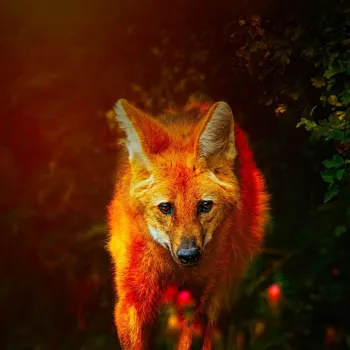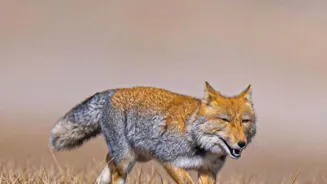Discover the Indian wild dog's secrets: 10 facts on Dholes' survival skills. Delve into their world now!
The Indian wild dog, or dhole (Cuon alpinus), is a fascinating creature often overshadowed by its
more famous cousins like tigers and lions. Found in various parts of India, these canids are highly social and possess remarkable survival skills.
Let's delve into ten unique facts that highlight their resilience and adaptability in the Indian wilderness.
Dholes' unique vocalizations show sophisticated communication for survival
Dholes are not your average dogs; they have evolved unique communication methods. They use a diverse range of vocalizations, including whistles, clucks, and screams, to communicate within their packs. These sounds help them coordinate hunts, warn of danger, and maintain social bonds.
This vocal complexity sets them apart from many other canid species and showcases their sophisticated social structure which is a testament to their adaptability.
Studies have shown that different dhole packs even have distinct "dialects" of whistles, further emphasizing their unique communication abilities. This intricate communication system is crucial for their survival in the diverse landscapes of India.
Dholes excel in teamwork for hunting success
Dholes are masters of teamwork, employing cooperative hunting strategies to take down prey much larger than themselves. Unlike solitary hunters, dholes work together to chase, surround, and tire out their target.
Their coordination is impressive; some dholes might drive the prey towards an ambush while others lie in wait. This collaborative approach significantly increases their hunting success, enabling them to thrive in challenging environments.
They prefer ungulates like deer and wild pigs, which require a collective effort to capture. This demonstrates their complex social intelligence and the importance of cooperation in their survival.
Dholes excel as hunters with remarkable stamina
Their remarkable stamina is one of dholes' most prominent assets. They can maintain a steady pace for long distances, allowing them to exhaust their prey during hunts. This endurance is vital for chasing down fast-moving ungulates across varied terrains, from dense forests to open grasslands.
It's an adaptation that has allowed them to excel as hunters in the diverse Indian landscapes. Their bodies are built for this sustained activity, with strong legs and efficient cardiovascular systems. This remarkable stamina contributes significantly to their success in cooperative hunting.
Dholes adapt with 40 teeth for efficient hunting
Dholes, unlike other canids, have fewer teeth. While most dogs have 42 teeth, dholes only possess 40. This reduction in teeth doesn't hinder their ability to hunt and consume prey effectively. Their powerful jaws compensate for the fewer teeth, allowing them to tear and consume meat efficiently.
This unique dental adaptation reflects the evolutionary path they have taken in adapting to their specific hunting style. This is an example of how evolution shapes animals to fit their lifestyle.
Dholes exhibit adaptability in diverse habitats for survival
Dholes show remarkable adaptability to diverse habitats. From the dense forests of the Western Ghats to the Himalayan foothills, dholes thrive in a variety of environments. They are found in deciduous forests, evergreen forests, grasslands, and even alpine regions.
This adaptability is critical to their survival, allowing them to occupy different niches and cope with varying environmental conditions. Their ability to adjust their hunting strategies and social behaviors to suit different habitats underscores their resilience as a species.
Their presence across varied terrains is a testament to their adaptability.
Dholes maintain ecosystem balance as apex predators
Dholes play a vital role in maintaining the balance of their ecosystems. As apex predators, they help regulate populations of herbivores like deer and wild pigs. By controlling herbivore numbers, dholes prevent overgrazing and maintain habitat health.
This, in turn, benefits other species in the ecosystem. Their presence as predators is essential for maintaining a healthy and balanced environment. The cascading effect of their presence is significant for overall biodiversity.
Without dholes, the dynamics of these ecosystems would be drastically altered.
Dholes rely on strong family bonds for survival
Their social structure is built around strong family bonds. Dholes live in packs, typically consisting of related individuals. These packs are tightly knit, with members cooperating in hunting, raising pups, and defending their territory.
This strong social cohesion is crucial for their survival, providing support and security in a challenging environment. Within the pack, there is often a clear hierarchy. But cooperation is always prioritized. This collective approach is crucial for raising their young.
Dholes exhibit high intelligence in hunting strategies
Dholes possess keen intelligence and problem-solving skills. They are known to outsmart prey and adapt their hunting tactics based on the situation. Observers have noticed them using their intellect while trying to secure their food. This adaptability showcases their cognitive prowess.
Their ability to assess situations and react effectively is essential for thriving in the wild.
Dhole populations declining, conservation efforts needed in India
Their conservation status is a cause for concern. Dhole populations are declining across their range due to habitat loss, prey depletion, and disease. Organizations are working to protect this species through habitat preservation, anti-poaching efforts, and disease management.
Their decline is a reflection of the larger challenges facing wildlife conservation in India.
Dholes display territorial defense using scent marking and vocalizations
Dholes exhibit unique behaviors when defending their territory. They mark territories through scent marking. Further, they also make use of vocalizations to ward off intrude. They don't shy away from confronting predators who enter their space.

This demonstrates their commitment to protecting their family and resources. These behaviours are an essential part of their unique characteristics.
AI Generated Content. Glance/InMobi shall have no liability for the content



















